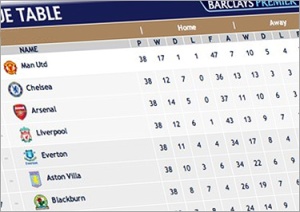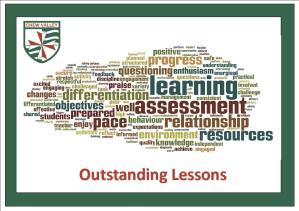The first post on this blog, in December 2012, was a tirade against the English Baccalaureate Certificates proposed by the then education secretary Michael Gove. In my first foray into the blogosphere, I was furious with the proposal for two-year linear courses assessed only by terminal exams, awarded numerical grades, only available in selected subjects and accessible only to some students. Fortunately, Gove saw sense and in February 2013 he performed what Stephen Twigg called “a humiliating climb-down” in parliament, claiming that the reforms were “a bridge too far.” The profession breathed a sigh of relief. I too am mightily relieved that instead of those awful EBCs we now have reformed GCSEs – two-year linear courses assessed only by terminal exams, awarded numerical grades, only available in selected subjects. Politics, eh?
In truth, the most hateful part of the EBC proposal was that low-attaining students would not be able to achieve them and would instead be awarded a “Statement of Achievement” by their school. My cynical side can’t help but think that this was a bluff – a proposal so awful that was always intended for withdrawal so the remaining policy was seen as a better compromise. At least the reformed GCSEs span the full attainment range and are accessible to all (in theory at least).
One of my other concerns about the EBCs was that, since they were only going to be available in EBacc subjects, they would create a two-tier curriculum favouring those subjects above others (whilst we’re on the subject, why isn’t RE a humanity?) This problem remains. The gradual roll-out of new-style GCSEs to English and Maths first, then other EBacc subjects, has already begun, but the status of other old-style GCSEs is still to be decided by Ofqual. All the rhetoric around the qualifications system has effectively devalued any A*-G GCSEs, and this was reinforced in July this year when the DfE confirmed that only reformed 1-9 graded GCSE qualifications would count in performance tables from 2017. The press release comfortingly stated:
“Schools may still enter pupils early for ‘legacy’ qualifications, but if they do pupils will need to either take the new GCSE in 2017 or progress to a higher level qualification, such as an AS qualification, for their achievements to count in tables.”
I have written before about this government’s use of the performance tables as a lever for change, and this is another prime example. Clearly, the DfE wants particular curriculum models in schools, favouring the English Baccalaureate route wherever possible. There is a whole raft of other qualifications and curriculum opportunities available, but they are being squeezed out by the fact that they don’t “count in tables.” You could teach alternative Science qualifications, BTECs and iGCSEs or even unexamined enrichment courses, and the students could get a perfectly balanced, rounded education, but if you want Ofsted to know how good you are you’d best stick to the new GCSEs and fill up the buckets in Progress 8 and Attainment 8 for as many students as possible. Woe betide those subjects that don’t make the cut when Ofqual decides which subjects get to be new-style GCSEs.
The summer holiday has given me enough time to pause and think. Who exactly are the new GCSEs for, anyway? All young people are now required to stay in education or training until they are 18 due to the rise in the participation age. This means that the GCSE is no longer the final qualification any young person will take. They will all go on to something else – A-levels, International Baccalaureate, Pre-U, apprenticeships, diplomas, certificates. The GCSE is an access ticket to the next stage. All the accountability measures for schools are focused on qualifications taken at 16, when all young people have to go on to study to 18. Surely, then, the new GCSEs are more about measuring school performance than they are about valuing the achievements of students?
We’ve been here before. The Key Stage 3 tests in English, Maths and Science, abolished by Labour in 2008 following a marking debacle, only existed to measure school performance. They were statutory and the new GCSEs are not, but you would be either brave or foolhardy not to play the game, such are the accountability stakes. And, as I’m well aware, the new GCSEs are likely to be the most valuable currency for young people to access academic post-16 provision, so we’d be doing learners a disservice not to deliver them. My wider concern is that the curriculum is being squeezed in an accountability stranglehold so that is consists only of those elements which “count in tables” – and that, I think, is wrong.
So what’s the alternative? Well, it is out there. Back in October 2004, the Working Group on 14-19 Reform published its report proposing the replacement of GCSEs and A-Levels with an over-arching diploma. Sir Mike Tomlinson, head of the working group, had established wide consensus for the overarching diploma. He foresaw the raising of the participation age and the need for a coherent qualification and curriculum system which encompassed the 14-19 age range, balancing vocational and academic study. For many reasons (detailed brilliantly in this BBC report from 2005) the government at the time decided that GCSEs and A-Levels were sacrosanct, and rejected the report’s proposals. This remains, in my view, the single biggest mistake in education policy I can think of (and I’ve seen a few). The diploma that was eventually introduced alongside the existing qualifications was a Frankenstein’s monster already doomed at its inception.
Rising from the ashes of this butchered mess, however, is a curriculum and qualifications proposal in the style of Tomlinson that I can really get behind. The Headteachers’ Roundtable have proposed their own qualifications framework – an overarching diploma-style approach incorporating existing qualifications into a true baccalaureate. This wasn’t on the agenda when they met with Tristram Hunt in July this year, and I can’t imagine that there will be much appetite for further curriculum reform after the complete overhaul that has happened over recent years. But it is sorely needed, as the system we are moving to is not fit for purpose and runs the risk of squeezing much that is good, important and necessary out of schooling altogether.

Tony Little – a voice of reason?
This week Tony Little said that the current examination system is “unimaginative [and] little changed from Victorian times…[obliging students] to sit alone at their desks in preparation for a world in which, for most of the time, they will need to work collaboratively.” He concludes that while a sharp focus on performance is a good thing there is more to education than “jostling for position in a league table.” Of course, he doesn’t have to worry about Ofsted, Progress 8, or the new National Curriculum, but when you find yourself agreeing with the Headmaster of Eton maybe it’s a sign that there’s something seriously wrong with the system.













